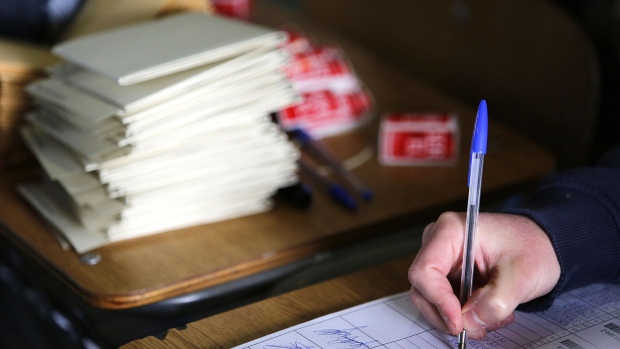Jul 18, 2021
Chile Holds Key Primary Vote in Wide-Open Presidential Race
, Bloomberg News

(Bloomberg) -- Chileans are heading to the polls Sunday in a primary election that will narrow a crowded field of candidates competing for the presidency amid a backdrop of lingering social unrest.
Citizens will decide which of two far-left candidates, Daniel Jadue and Gabriel Boric, and four right-wing contenders including Joaquin Lavin will advance in the race. Voters will be allowed to cast their ballot for any one of the six aspirants, and one from each side will move on. Polls will be open from 8 a.m. until 6 p.m. local time, with results expected hours later.
Read more: Outsider Candidates Upend Chile Politics and Unnerve Investors
The primary will serve as a giant opinion poll, allowing investors to gauge the balance of power between the political left and right amid simmering social tensions in the South American nation. Financial markets went into a tailspin after the ruling right-wing coalition suffered shock defeats in May’s vote for a Constitutional Assembly and in regional elections.
“There will be greater tension surrounding the results of the far-left primary,” said Sergio Lehmann, chief economist at Banco de Credito e Inversiones in Santiago. “Jadue is more radical from an economic standpoint, while Boric is more balanced. There aren’t substantial differences between the center-right candidates.”
The two winners will face each other in the first round of presidential elections on Nov. 21, along with at least two other candidates. There will likely be a runoff in December.
The traditional center-left parties that ruled Chile for much of the past 30 years following the end of the Augusto Pinochet dictatorship did not put forth contenders for the primary, yet will compete in November. Within this group, former government spokeswoman Paula Narvaez has already launched her candidacy. Senate President Yasna Provoste, who consistently ranks high in polls, may follow suit.
A survey carried out by Criteria Research in late June showed Lavin, who studied economics at the University of Chicago, ahead among center and right-wing voters with 34% of intentions. Meanwhile, Communist Party contender Jadue leads among the center and left with 56% of preferences.
Conservative candidates including Lavin would largely keep the free-market model that has prevailed in Chile for the past forty years. On the opposite end of the spectrum, Jadue backs a radical overhaul, with higher taxes, a pension system revamp and more government involvement in providing basic services.
Chile’s next head of state will oversee the rewriting of the constitution and a nationwide referendum on the document. The winner will also face challenges such as rising debt stemming from emergency aid during the pandemic and demands for increased social spending following the 2019-2020 unrest.
©2021 Bloomberg L.P.








